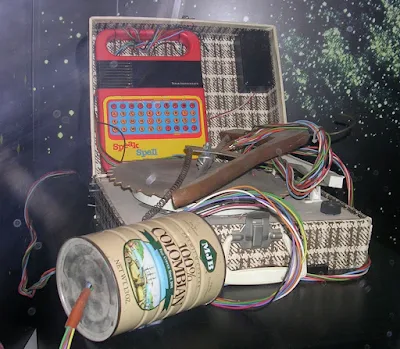 I knew that Alan Yates, VK2ZAY, was just the man for this project. Alan and I met up several years ago when Billy and I spotted and built his Trivial Electric Motor (we still have it, and occasionally fire it up to amaze visitors). On SolderSmoke 102 I mentioned the possibility of a one transistor QRSS transmit station. Obviously this would require some sort of mechanical keyer. I thought of a clock drive. Alan pointed out the in the 1982 Steven Spielberg movie, ET had used a saw blade as his mechanical modulator (see above). Alan also had some intriguing ideas of his own:
I knew that Alan Yates, VK2ZAY, was just the man for this project. Alan and I met up several years ago when Billy and I spotted and built his Trivial Electric Motor (we still have it, and occasionally fire it up to amaze visitors). On SolderSmoke 102 I mentioned the possibility of a one transistor QRSS transmit station. Obviously this would require some sort of mechanical keyer. I thought of a clock drive. Alan pointed out the in the 1982 Steven Spielberg movie, ET had used a saw blade as his mechanical modulator (see above). Alan also had some intriguing ideas of his own:G'day Bill,
Thanks again for noticing my QRSS signal making it through to Europe.
Your talk about mechanical solutions for QRSS modulators immediately
made me recall "E.T. the Extra-Terrestrial". The "Phone Home" device he
built had a modulator based on a sawblade IIRC - its been years since I
watched that 1982 classic.
One easy hack might be to use an AC synchronous motor out of a gobo
rotator (for example, I got one out of a fibre optic christmas tree that
expired from overheating). Its reduction drive results in a fairly slow
rotation which might drive a modulator plate. You could do the pickup
optically using a LED/photodiode (or transistor, or even an LDR I guess)
transmission pair. Electrical contacts would work too, but doing it
optically probably means it would have a longer life.
A tape loop system might also be practical and would allow long
modulations to be encoded at reasonable tape rates. A syncro-drive gobo
has to be turned fairly slowly and pushes the "density" of the data
fairly high so the mechanical or optical sensor gets harder to just
throw together. I am sure a clockwork driven disk could be made to
work, it just might have to be fairly large.
Mechanical readout might be a microswitch and holes in the plate, or
even using PCB material with the pattern on it (etched or masked), and a
brush contact. To minimise wear a brass small roller held against disk
with spring tension would work. Oxidation on aging might become a
problem - yeah the more I think about it I am liking optical better.
You can also do it electrically using a diode matrix which can be read
out with some counters. Of course that defeats the original purpose
which was to make a single transistor QRSS beacon with a mechanical
modulator.
One completely insane idea that just occurred to me is to build a slow
mechanical oscillator (say driven by a Stirling Engine or a Curie Point
Pendulum heated by a small candle) and modulate the RF oscillator with
that. The mechanics or thermal system might directly effect the RF
oscillator frequency. Who will make the first candle-powered QRSS
beacon with thermopile PSU? :-)
Regards,
Alan
http://www.vk2zay.net/
How about painting your message on an old vinyl record with conductive ink? Run the record player really slow, and use a couple brushes to connect it to your transmitter. I guess you could do the same with a non-conductive paint on an old circular saw blade. Just mask out the 'space' sections and let the 'mark' sections complete the circuit.
ReplyDeleteI like the record player idea. Sort of taking our lead from ET.
ReplyDeleteYou could somewhow adapt one or more "Cup of Tantalus" as a fluid driven low speed device. Yeah, half-baked...
ReplyDeleteQuoting part of this site:
http://www.kleinbottle.com/Tantalus.html
"By adjusting the fill rate from your faucet,, you can make a Tantalus Cup into into an intermittant siphon ... it fill for 30 seconds, then empty, then refill and empty. It's a fluid dynamics oscillator!"
Hi Again,
ReplyDeleteNow this might actually work...
Attach a long screw or fine pitch threaded stock to the second, minuite or even hour shaft of an AC mains alarm clock. Thread a nut on it and solder a stiff contactor wire to the nut. The contactor wire prevents the nut from spinning while simultaneously the nut drags the contactor wire across make/break sections of conductive tape or glued-down aluminum foil such that your call sign and message are sent in Morse over time.
You might even be able to rig the alarm and use it to stop the transmission after a given time.